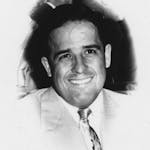As a 14-year-old boy in wartime Germany, Theodor Grage was pulled out of his Catholic seminary and forced into the anti-aircraft artillery to fight the Allies. Later, he deserted the German Army and waited out the war in hiding and impoverishment.
The boy went on to be a pioneering cancer surgeon in Minneapolis.
Grage, who developed a successful replacement surgery for cancer patients' throats, died Tuesday in Oak Park Heights of many ills, including heart and lung disease. He was 80.
Dr. John Najarian, organ transplantation pioneer and former head of the University of Minnesota's surgery department, said Grage was involved in groundbreaking cancer studies. "Ted Grage really was one of the best surgical oncologists," said Najarian. "He was really superb at it."
Najarian fondly recalled gatherings at the Grage's home in south Minneapolis, where the income tax-filing deadline, April 15, was celebrated with tongues in cheeks.
Grage had a harrowing childhood. In the early 1940s, the Gestapo "beat up all the priests and monks" and closed the Catholic seminary he was attending in his hometown of Münster, Germany, said his daughter, Kristin Grage of Minneapolis.
Grage deserted the German army in 1944, hiding in his family's bomb-damaged apartment with his father.
After the war, he completed medical training in Germany. In 1951, he realized his childhood dream of moving to the United States.
He completed U.S. medical school at Omaha's Creighton University and in 1957 moved to the Twin Cities to serve his residency at the University of Minnesota.
By 1963, he had earned a master's degree in biochemistry and a Ph.D. in surgery at the university.
And by 1982, he had developed a way to reconstruct a person's throat using a foot of the patient's intestine.
Dr. Henry Buchwald, professor of surgery and biomedical engineering at the university's medical school, was a resident under Grage's supervision in 1960.
"Most of his surgery was cancer surgery, very often for cases that others did not want to touch or felt incapable of doing," said Buchwald.
"He was a nice person to have around and be around," he said, noting that Grage took pride in his garden, growing vegetables once considered exotic in the Twin Cities.
Buchwald said Grage "was a vehement anti-Nazi." His daughter Kristin said the war "affected everything" in his life.
Because he had been so poor, he had a lot of compassion for poor patients, she said. "He wrote off a lot of bills for folks who couldn't afford to pay," she said.
He retired in 1992.
Grage was married for 36 years. He and his wife, Mary Ann, divorced in 1989; she died in 2004.
In addition to Kristin, he is survived by five other daughters, Maria Henly of Eau Claire, Wis.; Lisa Citak of Woodbury, Gina Owen of Rochester; Julia of Minneapolis and Claudia of Minneapolis; two sons, John of Hudson, Wis., and Peter of Minneapolis; two brothers, Rudi of Münster and Albert of Omaha, Neb.; a sister, Maria Baum of Telgte, Germany, and 12 grandchildren.
Services will be held at 11 a.m. Saturday at Kozlak-Radulovich Chapel, 1918 University Av. NE., Minneapolis. Visitation will be held from 5 to 8 p.m. today at the funeral chapel.



